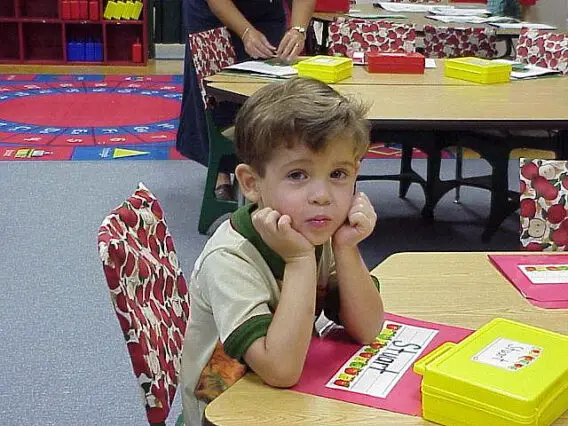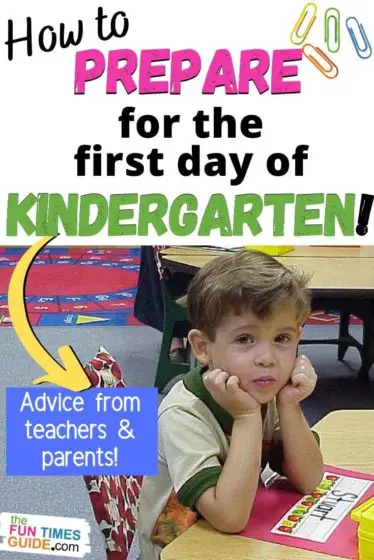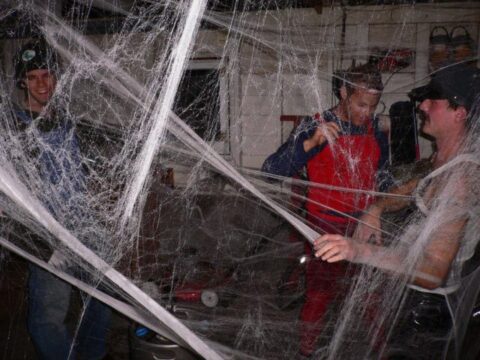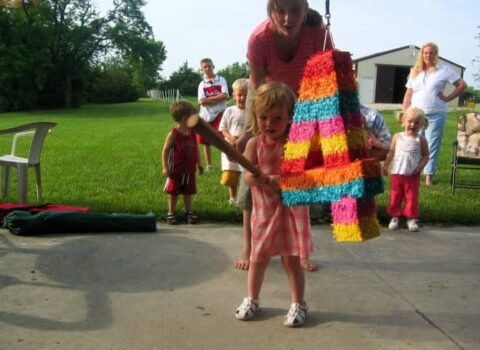August is national Get Ready For Kindergarten Month. This is a celebration to support a happy first day of Kindergarten for the millions of children in the US — but we’re celebrating early to help smooth the way for an easy transition!
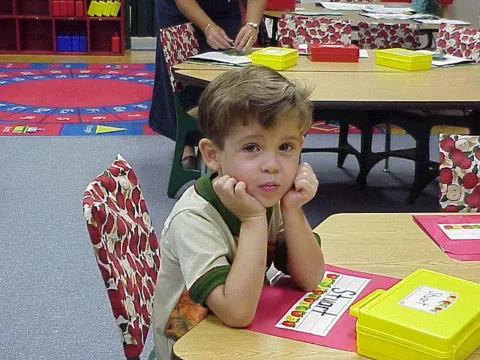
Do you feel like you’re a bit unprepared to send your child off for their first day of Kindergarten?
You’re not alone! Every parent has been there. Chances are, your child may be feeling nervous about the first day of school as well.
Many children, especially those with older siblings, have longed for this rite of passage. But others may be fearful of the change from the small, loving and comfortable preschool situation. Source
The best advice for parents whose children are getting ready to start Kindergarten comes from parents who’ve been there, done that. They have the absolute best tips to prepare your child (and yourself) for school and ease those Kindergarten first day jitters.
Following is a collection of all the best tips from parents and Kindergarten teachers to help you prepare for your child’s first day of Kindergarten…
How To Prepare For The First Day Of Kindergarten
#1 – Start talking about school several weeks before the first day of Kindergarten. Make it a daily routine to talk about school activities and what goes on there.
#2 – Begin including routines and structure to your child’s day in the months and weeks leading up to Kindergarten. Doing so will help to ease the transition to Kindergarten — because there will be a lot of structure and rules for your child to deal with in school.
#3 – Teach your child to write their name before school begins. Big letters, little letters — it doesn’t really matter. Your child’s confidence level will be boosted if they already know how to write something… like their name! Just as important: knowing their ABC’s and 123’s.
Q: What skills should my child have before Kindergarten?
A: Here’s a list of all the things that your child should know and be able to do upon entering Kindergarten. (Use this checklist to keep track of all the skills your child has mastered.)
#4 – Visit the school a few days before the first day with your child. Find your child’s Kindergarten classroom. Point out to your child where the bathroom is. Walk around the playground and any other areas that the Kindergartners will hang out. Also, take the time to drive by your child’s school a few times each week before school starts to familiarize them with the building and where they’re going.
#5 – Go through a few trial runs ahead of time, in order to test your child’s ability to deal with separation anxiety. Sunday school classes at church are a good test, as are trying out new babysitters at home, and leaving your child with another trustworthy adult for the first time.
#6 – If your child is nervous or fearful of being in a classroom without you around, try role playing. You act like the nervous child and your child can play the role of the teacher. Sometimes watching an adult act like a child is enough to break the tension and convince her how silly it really is. If you play school with your child in the days leading up to Kindergarten, your child will have some level of familiarity with the words and activities associated with Kindergarten.
Q: What happens first? Then what do we do?
A: It’s a good idea to call the school and ask for a daily schedule of activities to review with your child. But, in general you can tell your son that the day begins by putting their book bags in their cubbies and meeting on the circle line for the morning ritual — the Pledge of Allegiance, a short discussion of the day’s events, the calendar reviewed and perhaps a story read. Then it’s on to some seat work, then center time, snack, recess, more seat work, and then lunch. Usually this is followed by nap or quiet time, and then the “specials” (art, music and dance). Then it’s pack up and get ready for dismissal time. Source
#7 – Make sure that your child can dress and undress himself, as well as use the bathroom independently. Think along the lines of being able to tie his shoes, zip up his coat, button his pants, secure his belt after using the restroom — just the basics that give your child a sense of independence (and confidence).
Q: What if I don’t make it to the bathroom and have an accident?
A: It’s quite common for teachers to request an extra set of underwear and pants, packed in a large zip-locked plastic bag just for this occasion. Tell your child that this is quite commonplace, and to just alert the teacher to their situation and a clean change of clothes will do the trick. No one else has to know about it, and therefore this is nothing to be concerned about. Source
#8 – Check out some books from the library that help children ease jitters about starting school. A few good ones are:
- The Night Before Kindergarten by Natasha Wing
- Look Out Kindergarten, Here I Come by Nancy Carlson
- Miss Bindergarten Gets Ready For Kindergarten by Joseph Slate
- Kindergarten Rocks! by Katie Davis
- Off To Kindergarten by Tony Johnston
- The Kissing Hand by Audrey Penn
- Countdown To Kindergarten by Alison McGhee
#9 – Gather the necessary Kindergarten supplies. However, the Kindergarten supplies that your child will need are relatively few — especially on the very first day of school. Your child’s teacher will probably have their own list of recommended Kindergarten supplies. So start small with a backpack, lunch box, pencils, erasers, a small box of regular-sized crayons, and paper. Be sure to write your child’s name on all of their supplies (including their coats and shoes). Use a permanent marker, if possible, because tape and other adhesives are likely to loosen quickly.
#10 – Make sure your child gets a good night’s sleep in the weeks and days leading up to the first day of school. This will give your child’s body time to adjust to a regular schedule. Besides, tired kids have a hard time learning. It goes without saying that a good breakfast routine is important as well.
Q: Do I have to take a nap?
A: Sure, but you don’t have to fall asleep! By Kindergarten, teachers realize that most kids won’t fall asleep (although some are out for the count within a few seconds of their heads hitting the cots!), but benefit from 45 minutes or so of rest and relaxation. Some teachers quietly read a book while others play soothing music. Emphasize that it won’t be an incredibly boring two hours of lying quietly on a cold floor! It’s often a sought-after respite by pooped-out kids, and many enjoy listening to the stories. Source
#11 – Encourage your child to take a small token from home with them on their first day of Kindergarten. Consider the following items: a family picture taped inside her lunchbox, a favorite sticker, or a small toy. (Keep in mind, toys are likely to become lost or left behind at school.)
Parents of first time Kindergartners make the mistake of thinking, “I’ll just stay a few minutes so my child feels more comfortable.” Who the hell are we kidding? It is you who needs to feel more comfortable. This sends a message that your child needs to be comforted. As soon as you slyly try to sneak out, your child will let out a blood curdling scream that can be heard in the front office, and a good first impression will not be made. If you are lucky enough to have a seasoned teacher, they will most likely position their entire body blocking the classroom door so no parents can enter. Windows will be covered with butcher paper making sure to allow no gaping holes for parents to wave furiously at their child. Kiss your child and go, and they will know there is no cause for alarm. They will be reassured by your demeanor that this is a safe and healthy place to be, and their nerves will be calmed. Source
Fun Ways To Celebrate Your Child’s First Day Of Kindergarten
- 12 Ways To Make The First Day Of School Special
- How To Talk About School With Your Child
- 10 Ways To Celebrate Your Child’s First Day Of Kindergarten
- Lots Of Encouraging First Day Of School Quotes
- 27 Hilarious Before & After Photos Of Kids On Their First Day Of School
By the way… you probably know some of these Colors Songs that most children learn, and the Alphabet Song too. But did you know there’s a Kindergarten Month Song to help kids remember the 12 months of the year?
Like this post? Save it to read again later… or share with others on Pinterest!
If there is ONE thing I like… it's C H A N G E! The four seasons and major holidays are my favorite times of the year to recharge — and redecorate. I mostly like to share frugal DIY ideas for seasonal home decorating and party planning (for both, indoors and outside). Because who doesn't enjoy entertaining at home?! But even if you don't host many parties, I think you'll appreciate my DIY hacks and clever ways to decorate your house for the major holidays including Halloween, Thanksgiving, Christmas. Because those are the times when people tend to have the most visitors and overnight houseguests.
